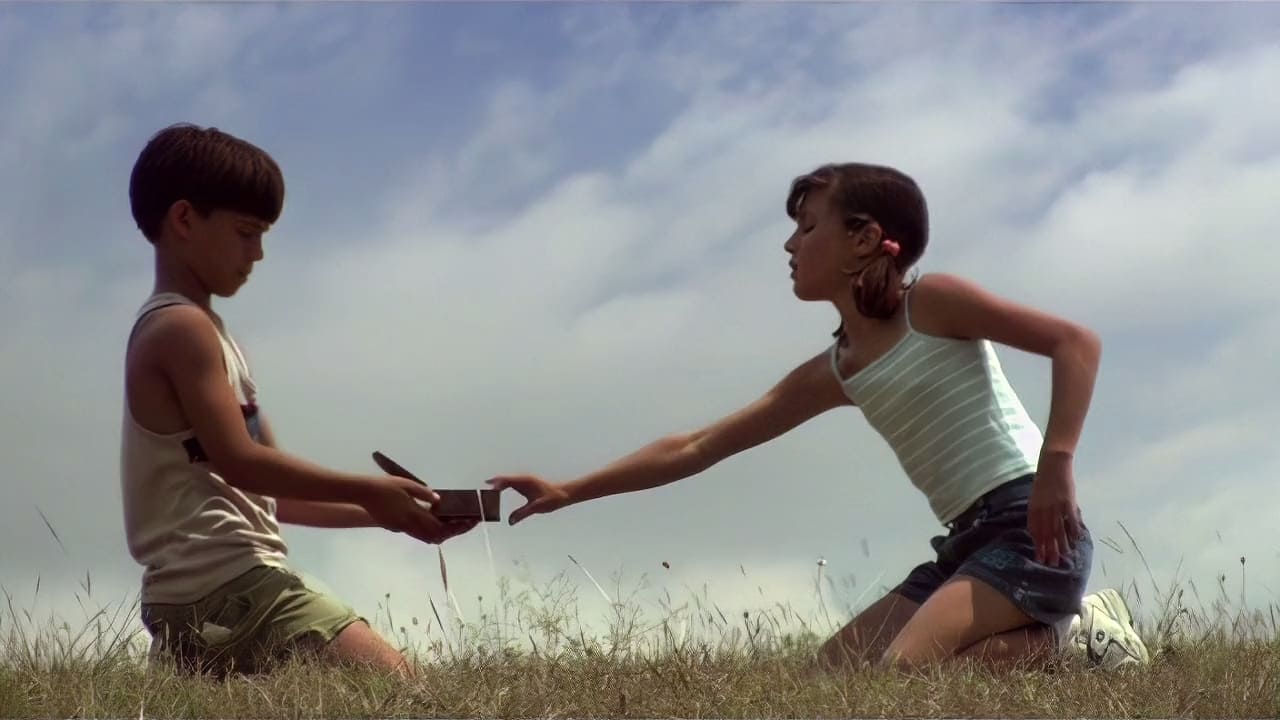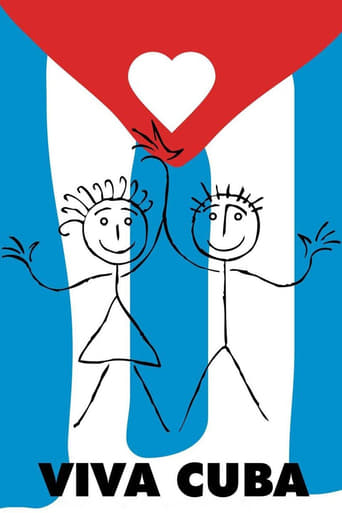



Horrible, fascist and poorly acted
Absolutely brilliant
I didn’t really have many expectations going into the movie (good or bad), but I actually really enjoyed it. I really liked the characters and the banter between them.
View MoreThrough painfully honest and emotional moments, the movie becomes irresistibly relatable
View MoreSimple story of a two runaway kids, raising lot of questions about Cuban society and it's system. It has an underline story line which contradictory to the film title Viva Cuba (Long live Cuba). Through out the film we see the patriotism and quotes like "Viva Che", "Viva Cuba" being thought to the kids like a religion, yet the distance and loosing their dreams in the system. In capitalism parents run "the race" distancing them from their kids and family. The same happens in Socialism where the parents prioritizing their duty to the country before their family. In both the situations it collapses the basic building block of the society. It is an open ending but leaves us thinking can a system make the life better. Can it answer the basic problems of life, or no matter what life will always find a way to make it miserable.
View MoreBy title, and by the knowledge of where this movie was produced, many who watch movies might be turned off, or suspect of the film's quality at best. The first Cuban film I've seen, I went in with expectations that were shattered by a, dare I say, cute and heartwarming tale of friendship and the human spirit. I know that people are people no matter where they live, and a liberal at heart. Even for me, this is the last place I would have expected to look for such a story, and one of the last things I would expect to result in a few tears.Immediately, the story disarms us of political prejudice, with a scene of boys, including Jorgito, one of two protagonists, playing the Cuban version of Cowboys and Indians in the street. They happen upon a girl of the same age, Malu, and we see Jorgito and Malu having the first of their several arguments, those reminiscent of old married couples. Malu wants to play Queen of Spain to which Jorgito objects, setting up the dichotomous relationship we learn of with their families, and I would assume countless more in Cuba.Jorgito's and Malu's relationship is shown developing throughout the first act, something between childish/flirty teasing and puppy love. Antagonism is introduced when Malu's mother plans to marry and leave the country, resulting in one of the most touching scenes in any movie, let alone one for children, with both children sitting on a roof overlooking Havana, discussing the situation. By the time we see Malu turning, unseen, to face Jorgito, borders are nonexistent. Friendship is the great equalizer. I was Jorgito and have always been.The two run away and set out on a journey from Havana to southeast Cuba, to find Malu's father and prevent him from signing the paperwork that would allow Malu to leave Cuba. The scenes comparing/contrasting their lifestyles and routines in packing and in preparing "for school" that morning are the funniest part of the film, which isn't short on good laughs throughout.The emotion invoked by "Viva Cuba" and the universality of feeling expressed in the dialog ("When I grow up I want to be in charge; to do what I want." and "If I were in charge I would let kids do what they want.") within the story's context is tactfully darling. In terms of story, "Viva Cuba" stands up to American children's films about friendship, such as "Up" and "Wall-E," even more true and raw from the protagonists' perspective (quite literally, as the camera angles are set low and we are presented with a few glimpses into their imaginations), as this film almost completely eschews the realities of the adult/real world until they come crashing (lightly) down at the ending with the friends' bond unaffected.The movie takes you through Cuba, but does not make you feel like you or the characters are under an iron thumb or not free. It doesn't promote or glorify the country either. With a rare backdrop, it presents a personal struggle against confinements and misfortunes that are commonly experienced the world over.
View More. . . which I saw as part of a film festival double feature following VIVA CUBA! These films are similar in that they are both about two 12-year-olds who feel misunderstood or neglected in their home situations, sense the stirrings of first love for each other, and decide to take a road trip across the island on which they reside. What the young people pack for their respective trips is one of the highlights of both of these movies. Among the differences of the flicks is the musical score. CUBA features upbeat Spanish pop songs, while MOONRISE is backed by dramatic English classical music. While MOONRISE is a big-budget picture featuring a cast of Bruce Willis, Frances McDormand, Bill Murray, etc., CUBA plays out with community-theater types probably working for food. MOONRISE's CGI is mostly missing in CUBA; the latter's ambiguous close with the kids disappearing in a crashing ocean wave might have been fixable if the director had had access to CGI resources adequate to make his actual intentions for the ending of his travel saga clear to his viewing audience.
View MoreIf you are planning a trip to Cuba any time soon, here are complimentary tips:1) Avoid this Island in July. unless you lived in a steam bath your whole life.2) Expand the trip to the country side. Cuba is much more than cigars and salsa bars.3) Whatever happens, never drive at night in the A1 freeway. it's wide and has no traffic but it has potholes big enough to have their own zip codesWhy am I telling you all this, you wonder? Well Cuba is an Island ensconced in revolutionary romanticism but shadowed by the stagnant leader who brought his country to the brink of bankruptcy. The U.S. embargo might be an inhibitor (and not a very justified one, I might add) but it's not the cause. There are plenty of reasons why there are hordes of Cubans wishing to go 98 miles north from Havana to the Miami border and leave the "revolution" for the enchanted tourists.One of those people is Divorced middle aged woman who, after a short grieving period over her mother's death, decides that her future will not be on Cuban soil. Unfortunately, her daughter Malu is a close friend with Jorgito who's mother and Malu's mother are arch-enemies, mainly because Jorhito's mother is a devout communist and Malu's mother is a "burgois" (in Cuban terms) Christian (Christianity is a legitimate practice of faith in Cuba since 1989).The disgruntled kids, Malu and Jorhito, know that once Malu's father will sign the exit authorization papers for his ex-wife, they will never see each other again. In a desperate attempt to save a deep bond that grown ups simply cannot attain, Malu and Jorhito go through a clandestine and perilous journey all the way from Havana in the North to Camaguay in the south. When I did this journey with my friend in a rental car, it took us 12 hours, 2 flat tires and the better part of 300$ so you can expect these 12 year old kids to stumble on a few obstacles of their own.The voyage to the bottom of the last communist nation on this planet (and no, China is not even remotely communist these days) is a test of the friendship its meant to save but its also a unifier between the alienated mothers who find out that they have more in common than they thought or should is say, cared to believe. The viewers get to find something else as well. They get to see Cuba outside the myth, away from the cigar factories, Hoze Marti's monuments and the colonialist architecture. Cuba is not only the one of Ernest Hemingway and Che's legacy of revolution, it's also the rural island of good natured people it always was. Even before Castro emerged from the Siera Madre and replaced a reign of tyranny with another.Those who get to know Cubans, know that the fledgling economy, dilapidating buildings and obsolete infrastructure diminished Castro's appeal and although no one misses Batista, it's more than obvious that after Ilcommendante passes on, Cuba will go through a very profound metamorphosis. That is not to suggest that Cuba will become corporation-land like its northern neighbor but the winds of change are breezing into the mujitos. This film, although doesn't criticize Castro and even depicts an overly complimenting view of Havana, adds little hints that Che's Ideology is not immunized from mortality anymore than Che himself was.Don't let my tedious manifest to make you believe this film is a history lesson or a camouflaged propaganda. This film is personal, it deals with the friendship of two 12 year old that are reluctant to succumb to the petty ways of the adult world. It's a story about two kids that rock their parents look on life simply by doing what they passionately believe in. The director, Juan Malberti knows that the appeal of the film is the genuineness of it's protagonists and he wisely let their acting talent (which they have in abundance) dictate the emotional scenes and set the tone of the film in general.This film didn't make me put a "Hasta la Victoria siempre" (Che's motto meaning: always until triumph) sticker on my car but than again, that isn't its goal. This film is about the triumph of friendship over hardship and, aided with a great cast, wonderful writing and almost-flawless direction, this film is one of the most enjoyable cinematic experiences I had in a very long while.I assume this movie can appeal to anyone, regardless of one's opinions about communism. The only Ideology endorsed in this film is that adult cynicism is never a match of the children's benevolent outlook.Of course, if you are into movies, you know that already.9 out of 10 in my FilmOmeter.
View More